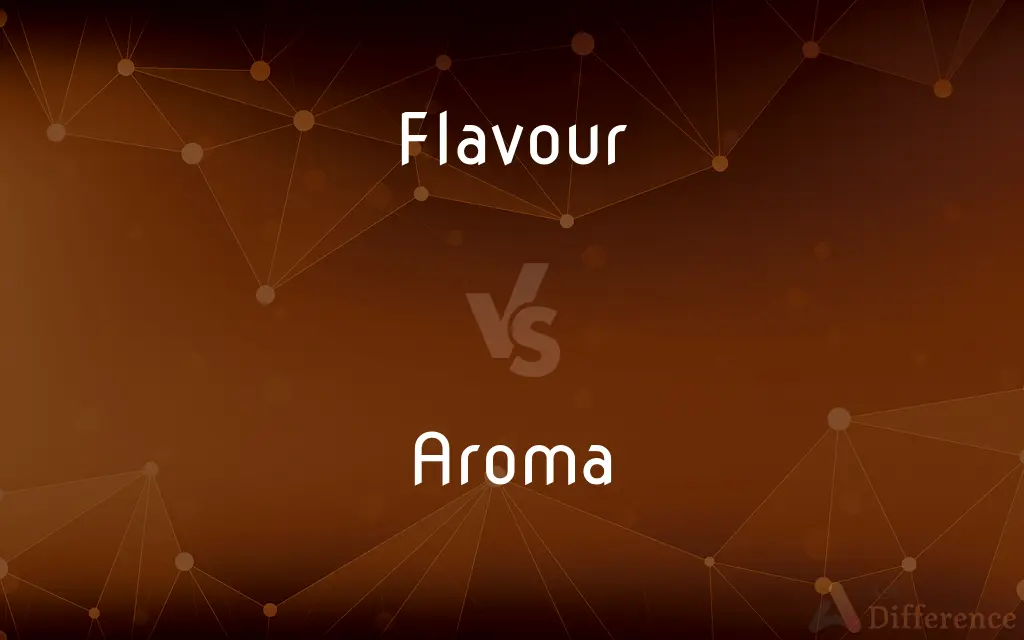Flavour vs. Aroma — What's the Difference?
Edited by Tayyaba Rehman — By Maham Liaqat — Updated on April 29, 2024
Flavour involves taste and smell perceptions together, primarily influenced by taste buds, while aroma refers solely to scents detected by the olfactory system.

Difference Between Flavour and Aroma
Table of Contents
ADVERTISEMENT
Key Differences
Flavour is a sensory perception that combines taste, smell, and other sensations, originating from a substance’s interaction with taste buds on the tongue. Aroma, on the other hand, specifically pertains to the smells emitted by substances, which are detected by the olfactory system in the nose.
In culinary contexts, flavour is influenced by various factors including ingredients, temperature, and texture. Whereas aroma is primarily influenced by the volatile compounds that are released from food and perceived by the nose.
People experience flavour through direct contact with the tongue, which can perceive sweet, sour, bitter, salty, and umami tastes. In contrast, aroma is experienced when volatile molecules enter the nasal passages and activate the olfactory receptors.
The enhancement of flavour in food can be achieved through cooking methods that increase taste complexity or texture, such as caramelization. However, enhancing aroma often involves ensuring the preservation or release of volatile compounds, like using herbs or toasting spices.
The perception of flavour can be affected by one's sense of smell; for instance, a cold can diminish the ability to taste foods fully. Aroma, however, solely depends on the olfactory system’s functionality and is directly impacted by such health conditions.
ADVERTISEMENT
Comparison Chart
Sensory Involvement
Involves taste, smell, and tactile sensations
Involves only smell
Detected By
Taste buds on the tongue and olfactory system
Olfactory system in the nose
Influenced By
Ingredients, temperature, texture
Volatile compounds
Perception Medium
Direct contact with substance through the mouth
Inhalation of scents through the nose
Common Enhancement
Cooking methods, seasoning, textural adjustments
Use of aromatic ingredients, proper storage
Compare with Definitions
Flavour
A particular quality of taste and smell.
The soup had a rich flavour of herbs and spices.
Aroma
A distinctive, typically pleasant smell.
The aroma of freshly baked bread filled the kitchen.
Flavour
The combined sense of taste and smell when consuming a substance.
The flavour of fresh strawberries is both sweet and slightly acidic.
Aroma
A scent associated with a particular quality or environment.
The aroma of pine trees is synonymous with forest hikes.
Flavour
The characteristic taste of a particular food or drink.
The distinct flavour of blue cheese is due to its unique mold.
Aroma
An indication of a substance’s freshness or quality through smell.
The aroma of fresh fish should be mild and slightly briny.
Flavour
An additive that imparts a specific taste.
Natural flavours are added to enhance the taste of yogurt.
Aroma
The quality or property of having a strong, pleasant odor.
A good coffee is determined by its aroma as well as its taste.
Flavour
A kind specified by its taste characteristics.
This candy comes in several flavours, including cherry and mint.
Aroma
The use of scent to make an environment more inviting.
The spa uses lavender aroma for a relaxing atmosphere.
Flavour
Variant of flavor.
Aroma
A quality that can be perceived by the olfactory sense
A room with an unpleasant aroma.
Flavour
Standard spelling of flavor#Noun
The flavour of this apple pie is delicious.
Flavour was added to the pudding.
What flavour of bubble gum do you enjoy?
The flavour of an experience.
Debian is one flavour of the Linux operating system.
Aroma
A characteristic, usually pleasant odor, as of a plant, spice, or food
The aroma of roses.
Flavour
Standard spelling of flavor#Verb
Aroma
A distinctive, intangible quality; an aura
The aroma of success.
Flavour
The general atmosphere of a place or situation and the effect that it has on people;
The feel of the city excited him
A clergyman improved the tone of the meeting
It had the smell of treason
Aroma
A smell; especially a pleasant spicy or fragrant one.
I love the aroma of cinnamon.
Flavour
(physics) the kinds of quarks and antiquarks
Aroma
The quality or principle of plants or other substances which constitutes their fragrance; agreeable odor; as, the aroma of coffee.
Flavour
The taste experience when a savoury condiment is taken into the mouth
Aroma
Fig.: The fine diffusive quality of intellectual power; flavor; as, the subtile aroma of genius.
Flavour
Lend flavor to;
Season the chicken breast after roasting it
Aroma
Any property detected by the olfactory system
Aroma
A distinctive odor that is pleasant
Common Curiosities
What is the basic difference between flavour and aroma?
Flavour combines taste, smell, and sensory input from the mouth, whereas aroma is strictly the scent perceived by the nose.
Is aroma more important than taste in determining flavour?
Aroma can be more influential than taste in determining flavour because the nose detects more subtle chemical compounds than the tongue.
How do aroma and flavour contribute to food enjoyment?
Aroma enhances anticipation and perception of food, while flavour provides the overall sensory experience combining taste and smell.
How does the environment affect aroma and flavour?
Environmental factors like temperature and humidity can enhance or diminish both aroma and flavour perception.
What is the impact of aging on flavour and aroma in foods like cheese or wine?
Aging can develop and intensify both the flavour and aroma of products like cheese and wine, as chemical reactions over time alter their profiles.
Can aroma affect mood and memory?
Yes, aroma can have a strong impact on mood and trigger memories more effectively than flavour due to the direct connection between the olfactory system and the brain.
How do professionals use aroma and flavour in food industries?
Professionals like chefs and food manufacturers carefully balance aroma and flavour to create appealing food experiences that meet consumer expectations.
Can flavour exist without aroma?
No, flavour is partly dependent on aroma; without the sense of smell, the complexity of flavour is significantly reduced.
How do aroma and flavour change with cooking?
Cooking can enhance aroma by releasing volatile compounds, while it can deepen flavour by transforming ingredients through methods like caramelization or Maillard reaction.
Why do some foods smell different than they taste?
Some foods release volatile compounds that are perceived differently by the nose than by the tongue, leading to a contrast between aroma and actual taste.
Can people with anosmia experience flavour?
People with anosmia, who cannot smell, can still experience basic tastes like sweet, salty, sour, and bitter, but the complexity of flavour is lessened.
What role does texture play in flavour and aroma?
Texture influences flavour perception through mouthfeel but does not directly affect aroma.
How do flavour enhancers work in relation to aroma?
Flavour enhancers amplify the taste elements of food, which can make the aroma seem stronger due to the enhanced flavour perception.
How can someone enhance their sensitivity to flavour and aroma?
Enhancing sensitivity can be achieved through practice and exposure, such as tasting sessions and mindful eating, focusing on the nuances of both flavour and aroma.
What scientific methods are used to analyze flavour and aroma?
Techniques such as gas chromatography-mass spectrometry (GC-MS) are used to identify and quantify aromatic and flavour compounds in foods.
Share Your Discovery

Previous Comparison
Cecum vs. Appendix
Next Comparison
Valve vs. SphincterAuthor Spotlight
Written by
Maham LiaqatEdited by
Tayyaba RehmanTayyaba Rehman is a distinguished writer, currently serving as a primary contributor to askdifference.com. As a researcher in semantics and etymology, Tayyaba's passion for the complexity of languages and their distinctions has found a perfect home on the platform. Tayyaba delves into the intricacies of language, distinguishing between commonly confused words and phrases, thereby providing clarity for readers worldwide.














































